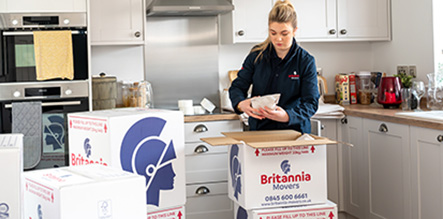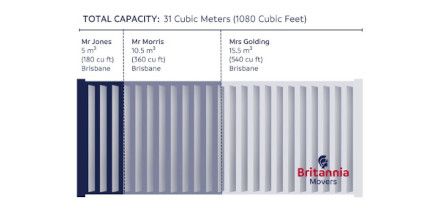Moving to Scotland
Beautiful views, spectacular rolling hills and crystal-clear lakes. There is a sense of serenity in Scotland that you can find in scarce few other countries. The people are friendly and have a proud heritage, with a culture that runs deep within the foundation of the country’s history.
If you are a lover of the countryside, enjoy hiking or have an untamed passion for cycling and aren’t overly bothered by cold weather, then Scotland is definitely the place for you. Even moving to a city like Glasgow or Edinburgh offers numerous benefits and opportunities for nature enthusiasts.
As part of the United Kingdom, Scotland speaks English as it’s native language but, if you aren’t used to it some of the thick accents you can find around the nation might be difficult to understand.
Low unemployment rates, progressive politics, free Universities and an overall high quality of life, Scotland has a lot to offer if you can get past the damp weather and lack of sunshine.
Removals to Scotland
Scotland might not be the biggest country in the world but there are still significant differences between each area. Travelling from one area to another will reveal a number of variations of traditions, culture, accent and geography.
If you are looking at hiring Britannia Movers to move you to Scotland but are unsure which area, you should be sure to do your research first. A good idea for newcomers to the country is to plan an extended visit so you can get to know some of the different locations. If you do decide to make a pre-move visit try to make it to one of Scotland’s famous festivals. One such as the well-known Edinburgh Festival is a great opportunity for visitors to experience a first-hand taste of the local culture, being able to sample music, food, drink and sports.
Even if you do fall instantly in love with Scotland, as I’m sure you will, it never hurts to be able to bring some of your favourite items from home with you. That’s where Britannia Movers International can help.
We have numerous branches across the UK and Scotland that can help you with your move. One such branch is Britannia Movers Glasgow, whose expertise in Scottish removals is unrivalled having operated in the area for over 35 years. We can ensure you get a first-class removals service that benefits directly from our experience and reputation as a friendly-family run company.
We can walk you through every step of the process, helping you with everything from packing to the different documents you might need for your new home. Relocating to Scotland has never been easier.
International Removals to Scotland
At Britannia Movers International we deliver a highly professional service. We understand that even if Scotland holds a number of cultural similarities to your home, it can still be a difficult time period. Moving to a strange place or country with a number of unknown possibilities can appear daunting, Britannia Movers want to minimise that stress and make the whole process as easy as possible.
We can arrange for our team to meet with you personally and go over all the specifics of your move, our service is tailored to all of your individual wants and needs. Arranging a meeting with one of our experts means that you can go over everything you want to, you can ask any questions and go over all the details, so you can rest assured you’re in safe hands.
This will also give us the chance to complete an international shipping survey with you if you are coming in from outside the UK. This is useful for our clients as they can decide what they want shipping to Scotland, what they want in storage and what items they would like to be sold or recycled.
The meeting will cover everything regarding budget, time frame and potential moving dates. While these don’t have to be set in stone on the day of the meeting, it’s a good idea to have a rough plan in place. This us helps us prepare and get the whole process on the way so everything is set and ready for your big day.
Additional Removal Services to Scotland
Britannia Movers International have been helping to move people for over 35 years, there isn’t anything we haven’t faced before and we really are prepared for anything. Whether it’s bringing the family pet or transporting your vehicle, Britannia Movers have got you covered.
No matter where you are moving to Scotland from, we can handle the paperwork and visas that you might need. We know that paper work can be a nightmare and stressful, so we aim to minimise that as much as possible for you, by handling it ourselves where possible.
Get in touch with us today to see how we can help you with all the personalised specifics to do with your move.
Packing
Whether the usual home goods or fragile and valuable items, our expert packing service ensures your goods are safe during the removals process.
Insurance
To give yourself complete peace of mind, why not look into our comprehensive package of insurance services?
Storage
At Britannia, we are able to provide national and international storage solutions that can be tailored to fit your needs.
Groupage Shipping
Did you know you can reduce shipping costs to Spain by sharing a container with other mover’s belongings?
Arriving in Scotland
Getting to Scotland from other parts of the UK is fairly straightforward. If you are coming in from Ireland or any other areas of the UK. Driving from even the south of England to the very peak of Scotland would only take 10 hours in the car. It might be worth remembering that your items might not arrive that quickly, however, one of our key aims is to get there as quickly as possible while remaining safe.
If you are planning a move to anywhere in Scotland give Britannia Movers International a call today on 0845 600 6661 or alternatively if you are planning a move around the Glasgow area, you contact our local branch, Britannia Movers Glasgow.
“Tracey Just a quick note to thank you guys for the move on Friday. The guys were fantastic and made the whole move seamless. Don’t know where people get these horror moving stories from as ours was definitely not. Will highly recommend to any friends moving. Regards Mr Woods”
Emigrating to Scotland
Scotland is an incredible country that hosts impressive landscapes with wondrous views, it is undoubtedly a truly blessed placed. While much of Scotland is home to rural landscapes it is far from a beautiful wasteland. There are huge numbers of dwellings that scale all the way from small hamlets and villages to the hugely industrialised cities of Glasgow and Edinburgh.
Much of the Scottish population inhabits medium-to large towns that can be found dotted around the country. Many of these places have a strong sense of community and heart-warming sense of extended family that reaches even to those who are new to the area. However, if you are moving in from the UK you should be prepared for a minor culture shock, the way the Scottish view history and tradition is very different from the rest of the UK. While language, food and ideals are very similar between the two, the way the Scots live is of a different manner to their English cousins.
Scottish History
Scotland has been inhabited by human life for over 5000 years, some of the earliest archaeological discoveries are agricultural tools that can be dated back to the year 3000 B.C. Many of these tools give evidence that the first Scotsman were primitive hunters, farmers and fisherman.
These people grew into numerous tribes that many historians will refer to as the Celts, a ferocious people that covered much of the United Kingdom prior to the invasion of the Roman Empire led by Julius Caesar in approximately 55 B.C. The arrival of an organised and trained fighting force is something that very few of these tribes was prepared for and as the Roman Legions cut their way across Britain, many Celtic tribes fled north towards Scotland. The Roman Empire finally exerted completed authority over Britain by 43 A.D.
Despite a number of attempts to occupy what the Romans referred to as Caledonia, they were unable to completely conquer the region. In an attempt to keep the various tribes from continuously raiding Roman settlements, the famous Hadrian’s Wall was constructed. This wall is still visible today, while today it might not be effective at its original purpose, it is still an impressive feat for soldiers of the ancient world to have constructed. Measuring in at 73 miles long Hadrians Wall stood proudly at the north-west frontier of the Roman Empire for well over 300 years.
This is arguably why Scottish and Irish Gaelic, which are both from the same language branch of Goidelic, is only found outside of Britain. These languages were kept alive by the Celtic tribes who relocated outside of land governed by Romans. The other popular language spoken is Scots that is typically spoken in the lowers parts of Scotland.
Despite numerous clashes with the English throughout the centuries to come, the countries became united in what is known as ‘The Union of the Crowns’ in 1603. This was shortly followed by The Act of the Union in 1707 that tightened the two countries relationship and resulted in a single Parliament of the United Kingdom of Great Britain.
Today while there are many who might seek Scottish Independence, a 2014 referendum to decide the countries future resulted in 55% of the country voting to stay part of the UK. While this might slightly alter with the upcoming implications of Brexit, it seems the majority of Scotland still feel very close to their English neighbours.
Transit Options
If you have made the decision to move to Scotland then there are probably a number of different things you could be thinking about. One of these things, is what belongings do you need to transport?
While nothing is to big or small for us to transport, it might be wise to consider some of our alternative services. Packing, insurance and pet transport are all additional service options that we offer our clients. After all, is it really home without your pet dog or cat? Probably not.
If you are coming from overseas we also offer a number of different transport services such as air freight or shipping containers.
Whatever services you require, we are ready to sit down and chat about even the minor details to help make sure you are completely prepared for your move.
Scottish Visas and Passports
If you are a resident of the UK then you do not need a Visa or a passport to travel to Scotland however, it is not a bad idea to carry some form of identification with you like a driving licence. This also goes for EU citizens however, you will need a passport or a national identity card to ensure that your journey goes smoothly.
If you are arriving in Scotland from outside of the UK, or you are not a citizen of the UK then you will need a Visa and a passport. Additional paperwork might also be required but, Britannia Movers International are happy to go through the finer details with you.
With CIC for up-to-date information relating your individual circumstances.
Living in Scotland
Scotland currently has a population of over 5.4 million. This demographic is spread over approximately 79,000 square kilometres which is quite a large area when compared with the number of its residents. This means that those who do live in close proximity typically develop very close-knit relationships.
There are numerous reasons that you should be considering a move to Scotland, the people, the landscape, its education system and healthcare are all influential factors. After a while, you don’t even notice the lack of sunshine!
Weather in Scotland
Scottish weather is pretty similar to that of the rest of the UK. Just like the English, Scots survive in some pretty gloomy conditions with short summers and mostly low temperatures. However, the weather conditions certainly have their perks and play a big role in the amazing landscapes available.
If you live in Scotland you can also rest secure in the fact that you are extremely unlikely to be impacted by any sort of natural disaster. Earthquakes, hurricanes, tornadoes, volcanic eruptions and tsunamis are all almost unheard of in Scotland. While fisherman and mountain climbers can sometimes be exposed to some dangerous weather conditions, casualties are extremely rare.
Depending on where you settle in Scotland the overall climate and weather can be greatly impacted by its altitude and region. In the highest and most mountainous areas, heavy snowfall can be expected while the south of Scotland generally experiences very dry weather.
If you hadn’t planned on it, packing an umbrella and jacket or thick coat would probably be beneficial.
Glasgow
| Jan | Feb | March | April | May | June | July | Aug | Sep | Oct | Nov | Dec | |
| Temp °C | 3 | 3.1 | 5.1 | 7.2 | 10.5 | 13.5 | 14.5 | 14.3 | 11.9 | 9.3 | 5.3 | 3.8 |
| Rainfall (mm) | 124 | 82 | 95 | 62 | 70 | 67 | 78 | 95 | 120 | 128 | 124 | 126 |
Aberdeen
| Jan | Feb | March | April | May | June | July | Aug | Sep | Oct | Nov | Dec | |
| Temp °C | 2.9 | 3.3 | 5.2 | 7.1 | 9.5 | 12.7 | 14.1 | 14 | 12 | 9.3 | 5.7 | 4.1 |
| Rainfall (mm) | 71 | 52 | 54 | 51 | 55 | 53 | 64 | 70 | 68 | 76 | 77 | 71 |
Dundee
| Jan | Feb | March | April | May | June | July | Aug | Sep | Oct | Nov | Dec | |
| Temp °C | 2.4 | 2.5 | 4.9 | 7.4 | 10.1 | 13.7 | 14.7 | 14 | 12 | 8.9 | 5.2 | 3.3 |
| Rainfall (mm) | 67 | 45 | 48 | 42 | 51 | 51 | 55 | 64 | 63 | 65 | 61 | 61 |
Jobs in Scotland
If you aren’t looking for a career specific job, it is very easy to find employment in Scotland. There are lots of different restaurants, retails shops, pubs and fast food places that are regularly looking for both part-time and full-time staff.
Due to the country’s size obtaining a specialised job is a little trickier but, unemployment is far from rampant in Scotland. Medium sized and high-level jobs with more senior roles might be harder to find but will turn up eventually if you have the relevant level of experience.
There are a number of industries that are currently showing a number of shortages so if you have a background in the following industries you will most likely be in a good position to land a well paid job. These industries include construction, transport and communication, financial services, public administration, social work and education.
Finding a job in Scotland
Much of the international community amongst MEDCs are turning to the internet to find potential job prospects and Scotland isn’t any different. If you aren’t in any rush it might be worth looking for jobs in Scotland prior to moving, the wonders of the internet not only allow for job applications to be completed outside of the country but, a job interview can be held over applications such as Skype and FaceTime.
There are also a number of different recruitment agencies active in Scotland that can help you apply for jobs and find work in relevant fields.
Of course, finally, many places of work still accept the old school method of printed CVs. If you are looking for a job in the high street many places will place in-window advertisements. It is never a negative thing to promote yourself in person and many places of work are willing to hire someone if they can prove themselves to be capable.
You should never be afraid to directly contact any places of work or organisations that you are interested in working for.
Education in Scotland
The aim of the Scottish Government is to create policies and an approach to education that allows every child within the country to maintain the right to thrive in school. Scotland is dedicated to a committed excellence to providing first-class educational facilities to its children and young adults.
Going to school is free between the ages of 3-18 and schools in Scotland offer a full curriculum that offers knowledge and skills needed for later life.
Qualifications are gained in the last three years of secondary school after these are complete students are given the opportunity to move into further education. Further education is of a high standard in Scotland and the country has more world-class universities per capita than many other countries. These universities cost money to attend for UK residents but are free to EU citizens as from 2019.
Cost of Living in Scotland
Scotland is generally cheaper than living in other parts of the UK. Household items used on a day-to-day basis can be as much as 20% lower than in London or 10% cheaper than other areas of the UK.
The average yearly wage of Scotland is £23,150 and is the third highest of the 12 UK countries. Only London and the South East of England have a higher annual salary average. Typically many of Scotland’s living expenses are lower than that of the UK, making it a good financial move.
Scotland’s Currency
Scotland currently uses pound sterling (£) as its official currency and this monetary unit of exchange is used throughout the United Kingdom. While some of their banknotes do slightly differ to that of other UK countries, they are still valued as pound sterling and can be exchanged as such at all major banking organisations.
Scotland also widely accepts debit and credit cards with a huge number of ATM machines available for public use across the country.
Opening a Bank Account in Scotland
Opening a bank account in Scotland is very straightforward for residents of the UK. There are even a number of banking organisations such as TSB, Sainsbury’s, Tesco and The Royal Bank of Scotland that offer accounts in both England and Scotland.
For those who currently residing outside of the UK you will most likely need some of the following documents in order to open a bank account:
- Social Insurance Number (SIN)
- Passport and work permit or confirmation of residency
- Letter from your employer verifying income and stating contract terms
- Driver’s licence (if you have one)
- Reference letter from your bank in your home country
Cost of Everyday Items
Check out some of the items you are likely to purchase regularly whilst living in Scotland below. The comparison is made between London and Glasgow.
| Item | Price – London | Price – Glasgow |
| Milk (1 litre) | £0.90 | £0.84 |
| A loaf of white bread | £1.11 | £0.90 |
| Eggs (12) | £2.20 | £1.92 |
| Bananas (1kg) | £1.02 | £1.15 |
| Chicken breasts (1kg) | £6.65 | £5.85 |
| Coke/Pepsi | £1.26 | £1.08 |
| Pair of quality jeans | £63.54 | £55.03 |
| Ladies chain store dress | £31.47 | £28.89 |
| Nike Trainers | £69.09 | £59.60 |
| Cinema tickets (1) | £12.65 | £10.00 |
Healthcare in Scotland
Scotland offers comprehensive free healthcare to all of its residents. The Government is committed to creating a healthier Scotland through a strengthening of the National Health Service (NHS) of Scotland.
The NHS provides free accident and emergency treatment. A number of their services are also free to students, self-employed and employed residents. Some EU citizens may also be eligible for treatment. For more information, you can visit the official government website or simply talk to Britannia Movers International and we can help you find the relevant information.
If you are living in Scotland you are required to register with a local GP, this allows you to receive medical attention and treatment for all non-urgent health related issues. Registration is free, and appointments also have no charges, although there may be a cost for some prescribed medicines.
Renting a Home in Scotland
It is a very straight forward to rent a property in Scotland if you can’t find a home to purchase immediately. This might also give the opportunity to see if Scotland is somewhere you want to settle for the long-term future.
There are a number of tenancy rights in Scotland that protect tenants and keep them with a roof over their heads, safe from unjust actions. Renting can be done directly, through a housing association or via an estate agent. Options aren’t limited with the country having a number of property types to let across a variety of different areas.
Buying a Home in Scotland
Buying a home in Scotland has a slightly different process to other parts of the UK. While there are a number of similarities, Scotland has devolved government powers that have allowed them to implement a number of legal requirements not needed elsewhere.
The first major difference is that pre-sale a home is required to have a Home Report. This report is a survey that is made up by the seller that examines a number of different elements regarding the property. These can normally be completed in 2-3 days and aren’t particularly complicated or time consuming, they simply add a layer of protection for buyers.
As a result, solicitors are normally needed much earlier in the process. While Scotland has a number of very capable estate agents, the way the Scottish system works means that solicitors across the country act as traditional estate agents and play a major role in home sales.
Scottish Culture
As previously mentioned, Scotland has a very strong cultural history that makes up much of their day-to-day lives. They are a very proud people who are very passionate in almost anything that they put their minds to.
Religion and football both make up big parts of Scottish culture. Similarly, both have huge divisions in opinion. A well-known quote from an unknown author states ‘Scotland is one of the most tolerant and progressive countries in the world because they are still caught up in arguing over whether they should be protestant or catholic’. Similarly the Celtic Vs. Rangers argument in football is an equally sensitive topic, both of these things should be avoided in casual conversation if you aren’t familiar with them.
Languages in Scotland
In order of popularity English, Scots and Scottish Gaelic are all spoken across the country.
Gaelic can be traced back to the country’s Irish heritage and Celtic era. Currently, around 58,000 people speak the language and you can see how it subtly influences some areas of Scottish culture with a number of TV shows and road signs embracing the language.
Scots was the dominant language of the southern areas of Scotland for a number of years. This tongue is much closer to English and shares a number of similarities in dialect due to it originating from 15th century English.
Scottish Food and Drink
Scotland is host to some of the most amazing cuisines in the world, it is just unfortunate that so few of them can be considered healthy.
From Haggis to the deep-fried mars bars, you are extremely well disciplined if you manage to move to Scotland without putting on a couple of extra pounds. Just like their English neighbours, Scotland loves its fish and chips, chippies, as they are known, can be found in abundance across Scotland. This doesn’t even mention their amazing selection of deserts like Cranachan, the traditional Scottish pudding made with fresh raspberries and cream.
The national drink of Scotland is whisky, perhaps because it does such a good job of keeping out the cold. Whisky is not only consumed in large amounts across the country as a beverage, it is also used in a number of different cooked meals.
Public Holidays in Scotland
There are 9 national public holidays per year in Scotland, see these below. Each territory also has its own set of holidays too.
- New Year – 1st and 2nd of January
- Good Friday – March or April
- Bank Holiday – Early May
- Spring Bank Holiday – End of May
- Summer Bank Holiday – Early August
- St Andrews Day – 30th November (2nd December in 2019)
- Christmas Day – 25th December
- Boxing Day – 26th December












